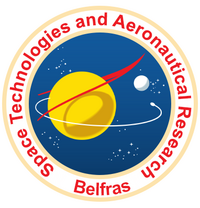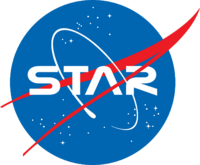STAR
This article is incomplete because it is pending further input from participants, or it is a work-in-progress by one author. Please comment on this article's talk page to share your input, comments and questions. Note: To contribute to this article, you may need to seek help from the author(s) of this page. |
 STAR Seal | |
 STAR "Meatball" insignia | |
 STAR "Worm" | |
| Agency overview | |
|---|---|
| Formed | March 18, 1955 |
| Preceding |
|
| Jurisdiction | Federal Government |
| Headquarters | Thessalona, Belfras |
| Motto | "Semper Sollicitus" (Latin: "Always Striving") (official) |
| Employees | 19,103 |
| Annual budget | B$22.7 billion (FY 2017) |
| Agency executives | |
| Website | www.STAR.bel |
The Space Technologies and Aeronautical Research Administration (STARA or more commonly STAR) is the Belfrasian Government's civilian space program which also acts as the the government's chief aerospace and aeronautical research agency. The organisation, an independent executive agency, was founded on March 18, 1955 under President Enzo Venatori in the passing of the Space Technologies and Research act (STAR) which called for the scrapping of the defunct Federal Aeronautical Research and Advisory Committee (FedAer). The resulting agency styled itself on the act's name, matching the abbreviation and referring to itself by the abbreviation since. The mission of STAR from the outset has remained to modern times, calling on the agency to "Pioneer the future in space exploration, aeronautical research, and scientific discovery."
Since the foundation of STAR, almost all space exploration conducted by the Belfrasian government has been under it's jurisdiction. The agency has been responsible for concepting, planning, and executing numerous programs such as a series of moon landings, the space shuttle program, and since the shuttle's retirement the Vinci Launch System (VLS) was designed by STAR for continued orbital service, citing that a capsule system was simpler, cheaper, and much safer. STAR stated that the shuttle, when fully loaded, weighed almost 110,000 kg and delivered almost 27,000 kg into orbit, a feat easily accomplished by much simpler and cheaper methods. The shuttle was designed specifically to be able to return satellites to the space center for refurbishment and repairs, but for safety reasons this was never accomplished. STAR operates several launch, assembly, and research facilities throughout the Federation, with the most well known being Galileo Space Center in Agonon.
Creation
Spaceflight programs
Manned programs
Libra Program (1958-1962)
Cassini Program (1961-1965)
Virgo Program (1965-1968)
Gemini Program (1968-1975)
Leonardo Program (1982-2001)
Pioneer Base Program (2004-present)
Planned programs
Project Pathfinder
Launch vehicle fleet
Roma Launch System
Vinci Launch System
Taurus Launch System
